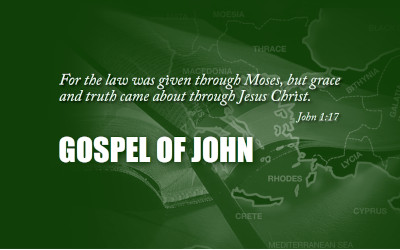John 10:1-42
The doorkeeper. Thieves and robbers. Who is the hired hand? Other sheep. The sin of blasphemy.
(Bấm vào đây để đọc tiếng Việt)
JOHN 10:1-42
 1 "I tell you the solemn truth, the one who does not enter the sheepfold by the door, but climbs in some other way, is a thief and a robber. 2 The one who enters by the door is the shepherd of the sheep. 3 The doorkeeper opens the door for him, and the sheep hear his voice. He calls his own sheep by name and leads them out. 4 When he has brought all his own sheep out, he goes ahead of them, and the sheep follow him because they recognize his voice. 5 They will never follow a stranger, but will run away from him, because they do not recognize the stranger's voice." 6 Jesus told them this parable, but they did not understand what he was saying to them.
1 "I tell you the solemn truth, the one who does not enter the sheepfold by the door, but climbs in some other way, is a thief and a robber. 2 The one who enters by the door is the shepherd of the sheep. 3 The doorkeeper opens the door for him, and the sheep hear his voice. He calls his own sheep by name and leads them out. 4 When he has brought all his own sheep out, he goes ahead of them, and the sheep follow him because they recognize his voice. 5 They will never follow a stranger, but will run away from him, because they do not recognize the stranger's voice." 6 Jesus told them this parable, but they did not understand what he was saying to them.
7 So Jesus said to them again, "I tell you the solemn truth, I am the door for the sheep. 8 All who came before me were thieves and robbers, but the sheep did not listen to them. 9 I am the door. If anyone enters through me, he will be saved, and will come in and go out, and find pasture. 10 The thief comes only to steal and kill and destroy; I have come so that they may have life, and may have it abundantly.
11 "I am the good shepherd. The good shepherd lays down his life for the sheep. 12 The hired hand, who is not a shepherd and does not own sheep, sees the wolf coming and abandons the sheep and runs away. So the wolf attacks the sheep and scatters them. 13 Because he is a hired hand and is not concerned about the sheep, he runs away.
14 "I am the good shepherd. I know my own and my own know me - 15 just as the Father knows me and I know the Father - and I lay down my life for the sheep. 16 I have other sheep that do not come from this sheepfold. I must bring them too, and they will listen to my voice, so that there will be one flock and one shepherd. 17 This is why the Father loves me - because I lay down my life, so that I may take it back again. 18 No one takes it away from me, but I lay it down of my own free will. I have the authority to lay it down, and I have the authority to take it back again. This commandment I received from my Father."
19 Another sharp division took place among the Jewish people because of these words. 20 Many of them were saying, "He is possessed by a demon and has lost his mind! Why do you listen to him?" 21 Others said, "These are not the words of someone possessed by a demon. A demon cannot cause the blind to see, can it?"
22 Then came the feast of the Dedication in Jerusalem. 23 It was winter, and Jesus was walking in the temple area in Solomon's Portico. 24 The Jewish leaders surrounded him and asked, "How long will you keep us in suspense? If you are the Christ, tell us plainly." 25 Jesus replied, "I told you and you do not believe. The deeds I do in my Father's name testify about me. 26 But you refuse to believe because you are not my sheep. 27 My sheep listen to my voice, and I know them, and they follow me. 28 I give them eternal life, and they will never perish; no one will snatch them from my hand. 29 My Father, who has given them to me, is greater than all, and no one can snatch them from my Father's hand. 30 The Father and I are one."
31 The Jewish leaders picked up rocks again to stone him to death. 32 Jesus said to them, "I have shown you many good deeds from the Father. For which one of them are you going to stone me?" 33 The Jewish leaders replied, "We are not going to stone you for a good deed but for blasphemy, because you, a man, are claiming to be God."
34 Jesus answered, "Is it not written in your law, 'I said, you are gods'? 35 If those people to whom the word of God came were called 'gods' (and the scripture cannot be broken), 36 do you say about the one whom the Father set apart and sent into the world, 'You are blaspheming,' because I said, 'I am the Son of God'? 37 If I do not perform the deeds of my Father, do not believe me. 38 But if I do them, even if you do not believe me, believe the deeds, so that you may come to know and understand that I am in the Father and the Father is in me." 39 Then they attempted again to seize him, but he escaped their clutches.
40 Jesus went back across the Jordan River again to the place where John had been baptizing at an earlier time, and he stayed there. 41 Many came to him and began to say, "John performed no miraculous sign, but everything John said about this man was true!" 42 And many believed in Jesus there. (John 10:1-42)
THE DOORKEEPER
2 The one who enters by the door is the shepherd of the sheep. 3 The doorkeeper opens the door for him, and the sheep hear his voice. (John 10:2)
In verse 7 of this passage, Jesus states that He serves as “the door for the sheep.” He reiterates a similar message in John 14:6: “I am the way, the truth, and the life. No one can come to the Father except through me.” This prompts the question: What, then, is the responsibility of the gatekeeper?
The gatekeeper’s duty involves adhering to the guideline posted at the entrance, which dictates who may enter and who must remain outside. This directive can be summarized as follows: “Therefore, be perfect, just as your heavenly Father is perfect” (Matthew 5:48).
But how can one achieve perfection? The sole means is to accept the gift of righteousness provided by Christ through trust in His completed work on the cross. Those who rely on adherence to the law will find themselves excluded because the law cannot grant them the righteousness they require. As stated in Galatians 5:4: “You who are seeking to be justified by the law have been severed from Christ; you have fallen away from grace.”
THIEVES AND ROBBERS
7 So Jesus said to them again, “I tell you the solemn truth, I am the door for the sheep. 8 All who came before me were thieves and robbers, but the sheep did not listen to them. (John 10:7)
Who were the individuals preceding Jesus? Before we delve into this question, let’s revisit the purpose of His arrival.
Jesus came with the explicit mission of sacrificing Himself on the cross to atone for humanity’s sins, facilitating reconciliation with God. The timing of His coming aligns with what He termed “the field is now ripe for harvest.” Therefore, any endeavor to achieve reconciliation apart from what Jesus came to accomplish can be regarded as the efforts of thieves and robbers.
Jesus’ method of reconciliation revolves around faith in His redemptive work on the cross. It’s evident that in many of the world’s religions, the prevalent approach involves fulfilling specific sets of rules or regulations, often referred to as laws. Jesus characterizes these approaches as the actions of thieves and robbers.
While Jesus initially referred to those who came before Him, we now recognize that there are also “thieves and robbers” who have emerged after His time.
WHO IS THE HIRED HAND?
11 “I am the good shepherd. The good shepherd lays down his life for the sheep 12 The hired hand, who is not a shepherd and does not own sheep, sees the wolf coming and abandons the sheep and runs away. So the wolf attacks the sheep and scatters them. (John 10:11-12)
Speculating about the identity of the hired hand is challenging, but we can start by considering Jesus, who is not a hired hand but the good shepherd. Furthermore, as stated, “the good shepherd lays down his life for the sheep.”
While someone might be willing to give their life for another, Jesus’ act of sacrificing Himself for His sheep is unparalleled. His death accomplishes what seems impossible: the forgiveness of humanity’s sins. He stands alone as the perfect Lamb of God, uniquely qualified and the Almighty God Himself. Those of us who serve Him in various ministries are blessed to be referred to as hired hands, distinct from thieves and robbers.
OTHER SHEEP
16 I have other sheep that do not come from this sheepfold. I must bring them too, and they will listen to my voice, so that there will be one flock and one shepherd. (John 10:16)
“This sheepfold” represents the chosen people of God who heeded the call of Jesus. The other sheepfold represents the non-Jews who later also came to Christ in spite of them not being descendants of Abraham. So ultimately “there will be one flock and one shepherd.”
THE SIN OF BLASPHEMY
31 The Jewish leaders picked up rocks again to stone him to death</strong>. 32 Jesus said to them, “I have shown you many good deeds from the Father. For which one of them are you going to stone me?” 33 The Jewish leaders replied, “We are not going to stone you for a good deed but for blasphemy, because you, a man, are claiming to be God.” (John 10:31-33)
We commonly link the sin of blasphemy with using improper or disrespectful language toward a person in authority. If you were to ask Bard or ChatGPT, they would provide this interpretation. However, it’s difficult to fathom that Jesus would be accused of such a sin if this were the case. Only someone lacking wisdom would commit such an act against a person in authority.
In the perspective of the Jews who were on the verge of stoning Jesus, He was viewed as “a man who claimed to be God.” On a related but equally significant note, the sin of blasphemy against the Holy Spirit could be described as “a man claiming to be the Holy Spirit” or, to put it differently, someone attempting to assume the role of the Holy Spirit in another person’s life.
Nghi Nguyen
- Scripture quoted by permission. All scripture quotations, unless otherwise indicated, are taken from the NET Bible® copyright ©1996-2006 by Biblical Studies Press, L.L.C. All rights reserved.
Disclaimer: This is my own opinion on the topic, which does not necessarily reflect the church's theology, or beliefs of the individuals in it — Nghi Nguyen
